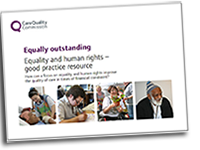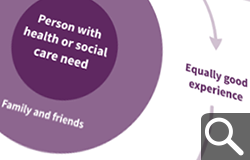How can a focus on equality and human rights improve the quality of care in times of financial constraint?

We often see equality and human rights as a challenge, rarely as a solution.
Yet there is growing evidence that equality and human rights for people using services and staff needs to play a central role in improving the quality of care. We are finding that some of the best providers are doing this successfully – even in times of constraint.
We have updated the good practice resource and also published:
- more case studies
Why pay attention to equality and human rights?
Ethical case
Paying attention to equality and human rights improves care as it gives people the outcomes they want.
Human rights covers the FREDA principles of:
- fairness
- respect
- equality
- dignity
- autonomy
Outstanding providers have tackled this by putting better outcomes for people at the heart of their service development.
Person-centred care is essential because it:
- is based on respect and autonomy
- meets individual needs so helps achieve equality.
The model – A person centred view

A focus on equity of access, promoting human rights, equally good experience of care and equity in outcomes will create good quality care for all.
Attention to equality and human rights is also needed at a service, rather than an individual, level to tackle specific quality improvement issues.
Business case
Workforce equality:
- There is a link between equality and inclusion for health and social care staff and quality of care
- Improving workforce equality can reduce costs by reducing staff turnover, absenteeism and disciplinary action.
- A diverse workforce adds value to the organisation.
For people using the service, addressing equality and human rights can both improve the quality of care and save costs. For example:
- sending information in appropriate formats or languages could reduce missed appointments
- environmental adaptations in social care services can increase autonomy
- welcoming, easily accessible services can lead to earlier diagnosis and treatment
We see links between quality ratings and how providers perform on equality and human rights.
Economic case
A focus on equality and human rights can save the country money. For example:
- ill health, or a deterioration in people’s health, can be prevented if health inequalities or barriers to accessing services are tackled
- ill health leads to lower productivity and higher welfare costs
- services can help enable people to participate socially and economically.
Legal case
Considering equality and human rights is often a legal requirement.
- CQC regulations underpin our work to register, monitor and inspect health and care services. They are designed to ensure that people using services have their human rights upheld.
- The Mental Capacity Act 2005 gives specific human rights protection to adults who may not be able to make particular decisions.
- Service providers must comply with equality legislation
This resource
It aims to help providers put equality and human rights at the heart of their improvement work so that the quality of care gets better for everyone.
We looked at case studies and identified nine common success factors. We illustrate these with examples.
We also look at how:
- focusing on equality and human rights can minimise the impact of challenges in times of financial constraint
- commissioners, regulators and policy-makers can support providers to focus on this issue
- equality and human rights can be advanced beyond provider boundaries - empowering people and communities and including area-based approaches to care .
We have produced this resource in partnership with key healthcare and equality organisations.
Download
Equally outstanding: Equality and human rights – good practice resource (November 2018)
Equally outstanding: Equality and human rights – good practice resource summary (November 2018)
Equally outstanding: Equality and human rights – good practice resource (easy read)
Good practice examples
Find out about the nine common success factors and examples from outstanding services